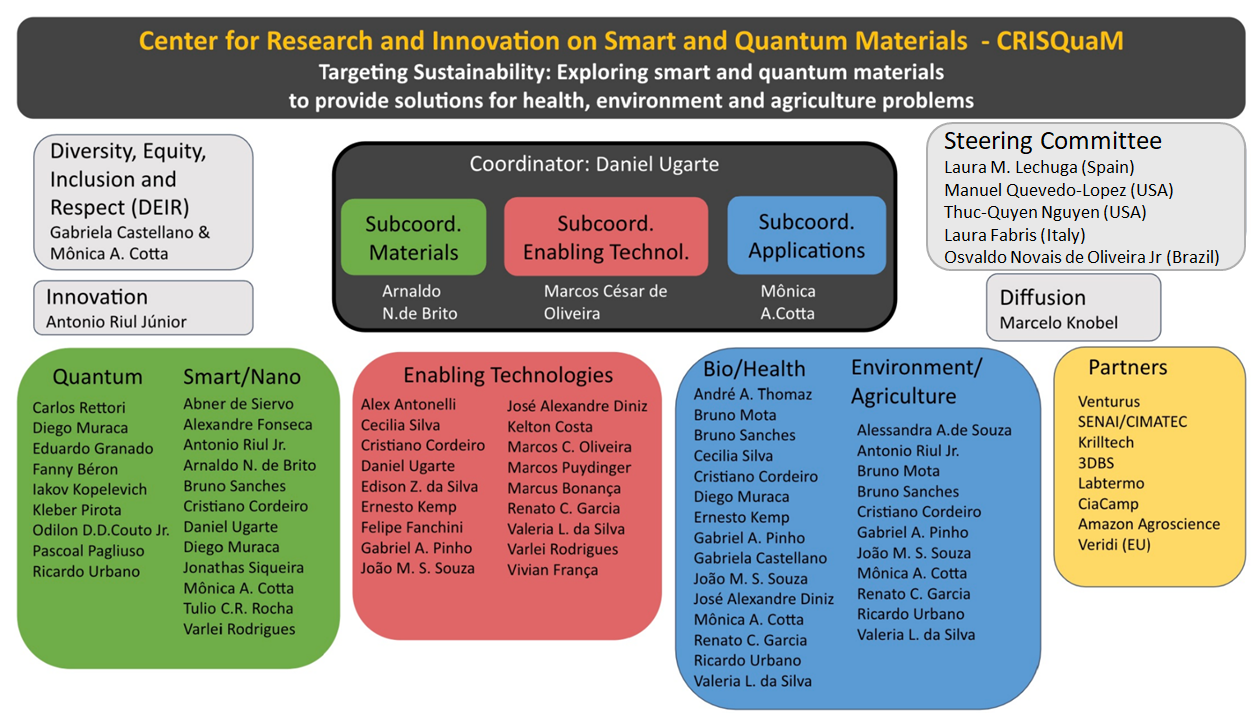BV-FAPESP: research projects supported in this Center
CRISQuaM in the Media: news about the center
CRISQuaM aims to explore the synergistic development of fundamental and applied science to create new materials with high potential for the construction of devices and sensors to address technological challenges related to sustainability, climate change, precision agriculture, ecology, and health. To achieve these goals, we have assembled an interdisciplinary and collaborative research team, integrating expertise across various scientific domains, researching novel materials with high innovation potential. By combining original synthesis methods, advanced characterization techniques, theoretical approaches, computational simulations, quantum technologies, and device construction designs, we aim to drive advances in smart and quantum materials, promoting scientific excellence and technological development. With this, we plan disruptive innovations in instrumentation—including hardware and AI-based tools—as well as in quantum technologies, biomedical devices, and signal processing, in addition to plant bionics, exploring plant-pathogen interactions. Besides research activities, we plan intensive actions in education, dissemination, and communication for the general public, as a modern society should be aware of the challenges humanity faces and how research and technology are essential for responsibly utilizing the planet's limited resources. CRISQuaM's Innovation activities are accelerated through partnerships with several companies in related technologies, many of them Brazilian. Finally, all activities of the Center are managed in accordance with diversity, equity, and inclusion goals and best practices.
The Center brings together scientists, engineers, and innovators in a collaborative effort to apply materials science and quantum technologies at the cutting edge, designing new materials and nano(bio)sensors for advanced diagnostics. The Center has a team capable of producing a wide range of (nano/micro) materials, along with precise chemical and physical characterizations using modern techniques (synchrotron, advanced microscopy, magnetotransport, magnetic resonance, optics, etc.). In addition, the team offers various options in enabling technologies, including miniaturization, processing, and additive manufacturing, as well as instrumentation, quantum sensing, and electronics development. Data analysis will employ updated approaches (numerical simulation, classical and quantum machine learning, and quantum optimization). Applications at the knowledge frontier will address urgent sustainability needs in environmental areas, precision agriculture, plant bionics, and biomedical interfaces, contributing to the development of local technologies in close partnership with the Brazilian industry.
The organization of the Center is based on three pillars — Materials, Enabling Technologies, and Applications — together with partner companies, as described in the figure below.

2025-01-29
At an event held in Campinas (state of São Paulo, Brazil), FAPESP, Shell, UNICAMP, USP and UFSCar announced the renewal of support for the Center for Innovation in New Energies, which will have 15 new research projects dedicated to improving technologies to make Brazil an exponent in the energy transition.
2025-01-22
A study published in the Journal of Agricultural and Food Chemistry shows that this type of polymer may in future optimize production of this crop in terms of time, space and cost, favoring sustainable food production.
2025-01-22
The estimate, published in the journal Nature, is that 2.24% of tree species in the Amazon, Africa and Southeast Asia account for 50% of the 800 billion trees in the tropical biome. Listing the hyperdominant species, as they are called, helps scientists more accurately measure processes such as carbon storage.
2025-01-22
Studies conducted at the State University of Campinas have shown that physical training, combining strength training and aerobic exercise, improves lipid metabolism, reduces inflammation and reverses early immunosenescence in obese and diabetic individuals.
2025-01-22
The ‘Best Oral Presentation’ award at an event promoted by the Hospital de Amor in Barretos (São Paulo state) was given to doctoral student Mariane Tirapelle, who is part of the Cell Therapy Center and the Nucleus of Cellular Therapy teams.
2025-01-17
Researchers isolated a strain of Pseudomonas alcaligenes that can withstand temperatures as high as 44 °C from a hot spring in Chile, and characterized the substances produced by the bacterium that help it survive extreme conditions.